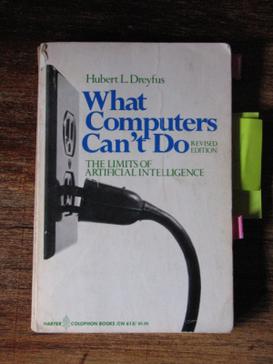TL;DR -- This post is about Dreyfus and his arguments about what computers can and cannot do from a philosophical position. Dreyfus was a student at Harvard. He taught at MIT and Berkeley. The post provides links to some of his material in the interest of future work related to technology.
--
We have a technological focus to pay attention to. Of late, the main topics have related to the xNNN/LLM approach that has been called "generative." In November of 2022, OpenAI released ChatGPT upon the public. It got acclaim and criticism. The former is still there as companies rush to make money on the idea, even though AI has had a troubled past in some cases.
Criticism range over a wide domain. For one thing, students got to using it to do their work. Again, companies have been using it where "fiction" is not an unlikely find. For instance, where PR doesn't have a firm basis. So, people came up with analogs, such as "lies" or "hallucinations" to describe the careless output. Well, actually, sophisticated, albeit misdirected, mathematics was doing the work.
A sister approach became quite adept at creating "fake" photos that could fool people. And, movies being a moving stream of photos, there were "fake" videos.
Since then, there is a newer version of ChatGPT. It has scored well on some tests. But, at the hard problems where guts and smarts are necessary, we still see low scoring. No one, in their right mind, would trust their lives being run by these new deals. Though, management decisions now are setting up the future for just that event.
Of all of the issues at hand, that is the one that really bears some attention due to its potential for errors. Oh yes, bias has come up in discussion as it seems to be inherent to the approach. There are many things to discuss, as said.
In the below, we will use "AI" to mean "artificial intelligence," in toto. We coined AIn't about two years ago with respect to the adulation being given xNNN (and its manipluative ways) which is only one aspect of what has been considered to be important to AI.
So, is any of the critical opinions other than new? You bet. The following is a summary.
- Hubert L. Dreyfus (1929-2017) is one example. He studied transcendental and existential phenomonology at Harvard and in Europe. He talked to some of the greats (Heidegger, Sartre, ...). He also was a professor at MIT which was the hotbed of the early development of AI. As we will see, he and AIers did not agree.
- While at MIT Dreyfus wrote "Alchemy and Artificial Intelligence" which was published by RAND and is available at the DOD site. Later, this paper became a book, What Computers Can't do.
- Later Dreyful publish an update since AI had made seeming progress. His new title was What Computers still Can't do. There is a "preview" available copy of this book at GDocs. In the commentary, there is this great quote about this work: ... was widely attacked but quietly studied. Dreyfus's arguments are still provocative and focus our attention once again on what it is that makes human beings unique.
- Hubert Dreyfus's views on artificial intelligence (at Wikipedia) has a great summary of the discussions and related themes. John McCarthy, early AI pioneer, mentioned that Dreyfus had good concerns, however his presentation and argument style was offputting. Which, in McCarthy' opinion was too bad as some necessary discussions were not to be.
thing that might be the result of this cycle of AI which has had several is that AI might now continue into the future as something that is recognized though without proper definition. It means different things to different people. But, over these decades, there have been many cases of AI involvment in progress and effective work. In fact, it's daily on the computer horizon and touches operational situations more than we might realize.
Remarks: Modified: 08/23/2023
08/23/2023 --

No comments:
Post a Comment